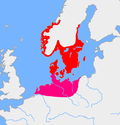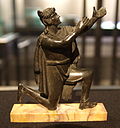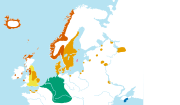Early Germanic culture was the culture of the early Germanic peoples. The Germanic culture started to exist in the Jastorf culture located along the central...
116 KB (14,622 words) - 07:33, 10 March 2025
the Early Middle Ages. The calendars were an element of early Germanic culture. The Germanic peoples had names for the months that varied by region and...
39 KB (3,175 words) - 23:52, 5 March 2025
position is held by rings in early Germanic cultures, appearing both in archaeology throughout areas settled by Germanic peoples, and in textual sources...
21 KB (2,174 words) - 08:16, 1 November 2024
Leges Barbarorum, 'laws of the barbarians', also called Leges) of the early Germanic peoples. These were compared with statements in Tacitus and Caesar as...
51 KB (6,444 words) - 13:33, 11 March 2025
Germanic culture is a term referring to the culture of Germanic peoples, and can be used to refer to a range of time periods and nationalities, but is...
7 KB (958 words) - 11:09, 13 February 2025
BC. Wars were frequent between and within the individual Germanic peoples. The early Germanic languages preserve various words for "war", and they did...
30 KB (3,537 words) - 21:04, 21 November 2024
Romano-Germanic describes the conflation of Roman culture with that of various Germanic peoples in areas successively ruled by the Roman Empire and Germanic...
5 KB (454 words) - 11:29, 7 September 2024
Germanic paganism or Germanic religion refers to the traditional, culturally significant religion of the Germanic peoples. With a chronological range...
128 KB (15,978 words) - 17:11, 30 March 2025
Early Germanic Literature and Culture is a book edited by Brian O. Murdoch and Malcolm Read. The book was published by Camden House in 2004. It covers...
5 KB (332 words) - 14:08, 24 December 2024
mythology, legendry, and folk beliefs of early Germanic culture. By way of the comparative method, Germanic philologists, a variety of historical linguist...
82 KB (2,409 words) - 01:37, 20 March 2025
Przeworsk culture also shows significant contact with the Jastorf Culture, associated with the spread of early Germanic tribes and the early Suevian peoples...
16 KB (1,854 words) - 10:59, 22 January 2025
Continental Germanic mythology. It was a key element of Germanic paganism. As the Germanic languages developed from Proto-Indo-European language, Germanic mythology...
9 KB (973 words) - 21:49, 12 March 2025
Vistula (Oksywie culture, Przeworsk culture), Germanic speakers came into contact with early Slavic cultures, as reflected in early Germanic loans in Proto-Slavic...
131 KB (12,240 words) - 23:06, 14 March 2025
The Germanic peoples were tribal groups who lived in Northern Europe in Classical Antiquity and the Early Middle Ages. In modern scholarship, they typically...
164 KB (20,238 words) - 13:45, 25 March 2025
from the Battle Axe culture, possibly through its superimposition upon the earlier megalithic cultures of the area. The Germanic tribal societies of Scandinavia...
91 KB (10,688 words) - 14:32, 16 March 2025
Goths (redirect from Germanic Goths)
Gentis: The Literature of Germanic Origins". In Murdoch, Brian; Read, Malcolm (eds.). Early Germanic Literature and Culture. Boydell & Brewer. pp. 39–54...
176 KB (19,160 words) - 02:07, 10 March 2025
Sippenhaft (category Family in early Germanic culture)
justifying collective punishment. As a legal principle, it was derived from Germanic law in the Middle Ages, usually in the form of fines and compensations...
11 KB (1,195 words) - 03:04, 7 February 2025
The Germanic substrate hypothesis attempts to explain the purportedly distinctive nature of the Germanic languages within the context of the Indo-European...
22 KB (2,134 words) - 18:10, 1 April 2025
Germanic and Slavic peoples, and inhumation is suggestive of nomadic practice, careful analysis suggests that the mixed burials were of an earlier period...
18 KB (2,081 words) - 15:05, 24 August 2024
Press in 1998. The book uses linguistic evidence for the study of early Germanic culture and history. A paperback edition was published by Cambridge University...
6 KB (399 words) - 06:04, 7 November 2024
vol. 7 Media related to Jastorf culture at Wikimedia Commons Germanic societies of the Jastorf and the Przeworsk cultures in southern and central Poland...
9 KB (933 words) - 21:23, 22 January 2025
Vandals (redirect from Carini (Germanic tribe))
associate the early Vandals with the Przeworsk culture, which has led to some authors equating them to the Lugii, who were another group of Germanic peoples...
67 KB (7,589 words) - 07:29, 30 March 2025
Runes (redirect from Germanic rune)
specialised branch of Germanic philology. The earliest secure runic inscriptions date from at latest AD 150, with a possible earlier inscription dating to...
67 KB (6,828 words) - 19:10, 29 March 2025
Norse clans (category Family in early Germanic culture)
descent of family groups. The heavy dependence on family and kindred in early Scandinavian history was the foundation of the importance clan. The Thing...
3 KB (323 words) - 14:38, 17 January 2025
Friedelehe (category Early Germanic culture)
"lover marriage" is a term for a postulated form of Germanic marriage said to have existed during the Early Middle Ages. The concept was introduced into mediaeval...
8 KB (950 words) - 14:36, 12 May 2024
Sippe (category Family in early Germanic culture)
extended family" (Frisian Sibbe, Norse Sifjar). It continues a Proto-Germanic term *sebjō, which referred to a band or confederation bound by a treaty...
2 KB (244 words) - 02:54, 7 May 2024
Germanic heroic legend (German: germanische Heldensage) is the heroic literary tradition of the Germanic-speaking peoples, most of which originates or...
109 KB (13,809 words) - 01:13, 20 March 2025
Childhood in the Viking Age (category Children in early Germanic culture)
medieval England Childhood in Scotland in the Middle Ages Childhood in early modern Scotland Sawyer, Birgit and Peter (1993). Medieval Scandinavia. Minneapolis...
5 KB (645 words) - 01:37, 7 January 2024
research into the Germanic languages began in the 16th century, with the discovery of literary texts in the earlier phases of the languages. Early modern publications...
4 KB (356 words) - 21:40, 9 March 2024
Nordwestblock (category Archaeological terminology (Germanic))
inhabitants of the area neither Germanic nor Celtic and so attributed to the people a distinct ethnicity or culture up to the Iron Age. So far, this...
14 KB (1,599 words) - 03:21, 17 March 2025















